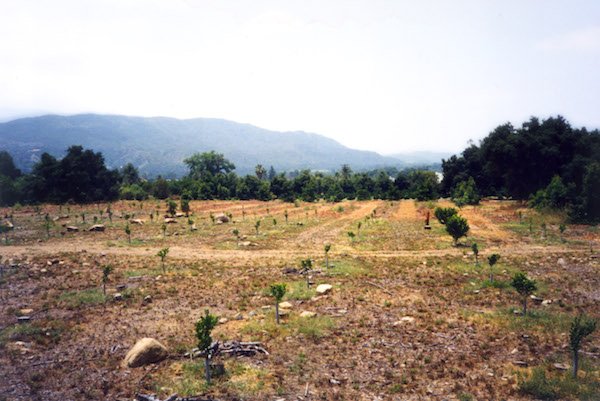Elevating Citrus Season with Churchill Orchard's Kishu Mandarin
A Taste Sensation Tailored for Your Customers
At Co-op Partners Warehouse, we understand the importance of providing unique and high-quality produce to our partners. Today, we want to shine a spotlight on a citrus gem that can elevate your citrus offerings – the Churchill Orchard Kishu mandarin.
Celebrating 20 Years of Citrus Excellence
In January 2004, the birth of the beloved "Little Wonder" Kishu mandarin brand marked a milestone – its 20th Anniversary. The journey began when Churchill Orchard encountered the Kishu in 2000. Intrigued by its cuteness and the potential for a delightful Christmas snack, they decided to plant 50 Kishu trees.
The first fruits were shared with Bill Fujimoto at Monterey Market, known for introducing Chuchill’s Pixie tangerines to his customers. The positive response led to more Kishu plantings, and soon, cafe and restaurant Chez Panisse embraced the Kishu, garnering praise from diners.
As demand soared, Churchill navigated the challenges of handling orders, marking the birth of the "Little Wonder." From the humble beginnings of packing the first mail order on the dining room table to the evolution through Logo, Recipe, Merch, and Meme eras, the Little Wonder journey became a testament to its charm and popularity.
Despite the occasional challenges, the Little Wonder persisted, becoming a beloved part of Churchill’s citrus offerings.
Here's to 20 years of delightful Kishu mandarins and the joy they have brought to our warehouse, markets, and hearts!
Churchills freshly planted Kishu trees.
Photo by tangerineman.com
A Brief History of Flavor and Passion
In the U.S., the Kishu mandarin has captured hearts and taste buds with its exceptional flavor and unique characteristics. Described as the best piece of citrus ever eaten, these tiny, seedless wonders are very different from the typical clementines found in grocery stores. Grown in select orchards in California and Florida, Kishu are only available for a brief window in February.
Introduced to the U.S. in 1983, seedless Kishu originated from cuttings received by citrus researchers at the University of California at Riverside from Japanese Kishu trees. Initially dismissed by growers as too "cute" for commercial success, the fruit found its way to a grower in Ojai, Jim Churchill. Along with his partner Lisa Brenneis, they established Churchill Orchard, the first orchard in the country to commercially produce Kishus. Today, they maintain close to 1,000 Kishu trees and ship the fruit across the U.S., with a demand that has often had entire crop selling out in just two weeks.
Despite their popularity, Kishu presents unique challenges. Known as the "difficult child of the orchard," they are sensitive to temperature and aridity, making them prone to weather-related challenges. Their small size requires a substantial quantity to fill a box, and the trees tend to produce less fruit over time. The short, intense Kishu harvest spans only a few weeks in January, after which the fruit is swiftly dispatched to various markets, specialty fruit distributors, and loyal customers across the country. Churchill Orchard's commitment to quality even extends to shipping restrictions in the northeastern U.S., where customers must sign for delivery to ensure the delicate fruit is protected from frost. The Kishu mandarin, with its exquisite flavor and limited availability, has become a cherished and sought-after citrus delight in the United States.
A Cultural Journey Through Time and Borders
Kishu mandarin has deep roots in Southern China and Japan. Originating in the 8th century, these mandarins were traditionally reserved for royalty and nobility, reflecting their significance. In ancient Japan, the preference for seeded mandarins was driven by superstitions linking seeds to family blessings, contrasting with the belief that seedless fruits could bring the end of family trees.
Introduced to Japan around 1200, Kishu mandarins remained a favorite in Tokyo until the 1800s when the larger satsuma mandarin emerged. The variety eventually made its way to the U.S. in the 1800s, gaining recognition in California and Florida. The modern era brought seedless Kishu mandarins to the U.S. in 1983.
Today, Kishu mandarins thrive not only in Asia but also in Europe, Australia, and the U.S. They have become a specialty variety in home gardens and are a sought-after fruit at farmers' markets and distributors when in season.
This cultural journey extends beyond borders, linking traditions like gifting mandarins during Christmas in Canada, influenced by Japanese immigrants. The beloved Unshu mikan, a cross between Kishu mandarin and kunenbo mandarin, accounts for almost 70% of citrus fruits in Japan, highlighting the enduring legacy of Kishu mandarins in global citrus culture. Explore the fascinating revelations about the origins of Unshu mandarin and ongoing efforts in Ehime, Japan, to enhance the deliciousness of this cherished citrus fruit here.
The Kishu mandarin, with its small size and big flavor, presents a unique opportunity for produce buyers and co-op stores to offer something extraordinary to their customers. The delightful taste and organic principles make it a standout choice in the world of citrus. Contact your CPW sales associate to stock up on this seasonally limited delight!



